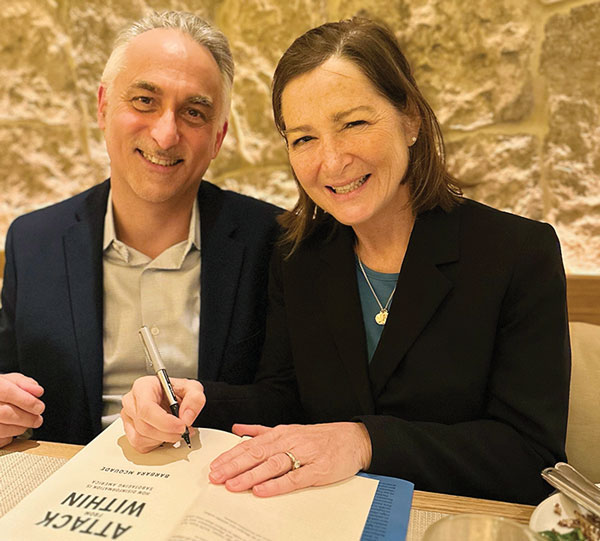In spring 2022, Seven Stories Press editor Greg Ruggiero read a New York Times op-ed that unnerved him. In it, University of Michigan law professor and former U.S. attorney Barbara McQuade discussed the then-upcoming state elections and how several candidates for secretary of state—the office that generally oversees voting in each state—were seeking to use the post as “a platform to spread disinformation” about the security of U.S. elections.
“What I saw in Barb’s message was an effort to warn the country about the very real possibility of fascism in America,” Ruggiero said. A few days later, Ruggiero emailed McQuade and invited her to expand her op-ed into a book. McQuade replied somewhat bashfully, he recalled, having never written a book before. But an introductory phone call and a few brainstorming sessions later, the two had mapped out what would become Attack from Within: How Disinformation Is Sabotaging America.
On February 27, the book landed with a splash, debuting at #3 on the New York Times bestseller list. Seven Stories publicity director Ruth Weiner largely credits McQuade for the book’s success. McQuade brought with her an audience from her appearances as a legal analyst on NBC News and MSNBC, her popular podcast #SistersInLaw, and some 680,000 followers on X. But there is also the book’s timely subject matter. The rising threat from disinformation is “arguably the most important issue of this historic moment,” said Seven Stories founder and publisher Dan Simon.
In Attack from Within, McQuade explores how bad actors at home and abroad are sowing division and eroding trust in the institutions that have sustained American democracy, and how social media platforms have become particularly potent engines of disinformation. The book’s final section offers several proposed solutions, all of which are anchored by a single core value: “an unyielding commitment to the truth,” McQuade writes. “While we can never rid politics of spin and advocacy,” she concludes, “we can insist on facts and refuse to perpetuate assertions we know to be lies.”
With some 67,000 copies in print so far, the book has resonated with readers. But it also feels especially pertinent for publishers. As trusted institutions, book publishers have long been regarded as bulwarks against disinformation. At the same time, however, book publishers have historically maintained a rather arm’s-length approach to fact-checking, for the most part putting the onus on authors to guarantee the accuracy of the facts contained in their manuscripts. But with disinformation on the rise, as McQuade argues in her book, is that kind of soft approach to accuracy still sufficient?
McQuade isn’t so sure. “While we all need to read with a critical eye to avoid being deceived or misled, publishers have a duty to the public to ensure that they are putting out accurate facts,” she said. “Failing to fact-check strikes me as a recipe for publishing false claims.”
Indeed, a scan of the publishing industry headlines suggests a number of recently published books might have benefited from a more rigorous fact-checking approach. Earlier this month, for example, critics took aim at White Rural Rage: The Threat to American Democracy by Paul Waldman and Tom Schaller (Random House), suggesting the authors misread or misused the academic data they relied on to create their political portrayal of white rural Americans. In a scathing piece in the Atlantic, contributing writer Tyler Austin Harper even cited the book’s “shoddy methodologies, misinterpreted data, and distorted studies” as evidence of an “anti-rural prejudice.” And Last November, former White House chief of staff Mark Meadows’s publisher, All Seasons Press, actually sued him after media reports suggested that Meadows told federal investigators that he had not seen any evidence of election fraud, seemingly contradicting statements in his book about the election being stolen.
While the political stakes have been raised in recent years, the issue of fact-checking for book publishers is hardly new. In a 2010 PW article, the late Random House publisher Daniel Menaker conceded that in the digital age it was probably time for publishers to revisit their fact-checking practices. Still, “total accuracy,” he said, will always be an “insoluble problem” for publishers, primarily due to costs. “It would be impossible for publishers to check all their books and still create an economy of scale.”
Ruggiero agrees there is “no simple answer” for publishers, especially in an age when the concern has shifted from James Frey’s embellishments in A Million Little Pieces, for example, to the kind of false narratives and alternative facts used to undermine our democracy. “Better fact-checking might mitigate misinformation,” he said, “but that does not address the willful attempt to achieve political domination through deception.”
At the same time, Ruggiero questions whether publishers can continue to risk passing the buck on accuracy. Indeed, Attack from Within was vetted by professional fact-checkers, which McQuade called an “essential” step in the book’s publication process. In addition, Ruggiero and McQuade worked “page by page” to check and cite sources (some “1,117 citations, to be exact,” Ruggiero said).
For Seven Stories, it is a matter of putting public interest over profit, Ruggiero suggested—something more publishers may also choose to do in these uncertain times. McQuade concurs: “Regardless of our political preferences, without a commitment to truth, we can’t expect to make any progress as a society.”
A version of this article appeared in the 04/29/2024 issue of Publishers Weekly under the headline: Make Facts Great Again
